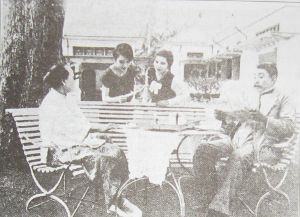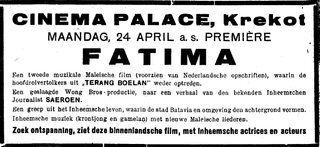Production
Indonesia Malaise was directed by the Wong brothers (Nelson, Joshua, and Othniel), ethnic Chinese who had studied film in the US. They also handled the cinematography and sound editing, using a single-system camera made in Europe and lent from a Bandung-based operator. Like the Wongs' other films, Indonesia Malaise was primarily targeted at lower-class native audiences. Only two of its cast members' names are recorded, MS Ferry and Oemar. The leading lady may have been a stage actress; the reporter Mohammad Enoh, who viewed Indonesia Malaise as a child, wrote in 1976 that she had been fairly attractive.
The film was among the first sound films released in the Indies, and the brothers' first sound film. The first such film, George Krugers' Karnadi Anemer Bangkong had been released the preceding year; The Teng Chun had followed with Boenga Roos dari Tjikembang (Rose from Cikembang) in 1931, although whether it preceded Indonesia Malaise is not certain. These early films had poor sound and much static, but through repeated experimentation the quality was eventually brought to acceptable levels.
The film has also the particularity of being the first in history to have the word "Indonesia" in its title. [5]
Release and reception
Indonesia Malaise was released in 1931 and was advertised as a film which would "surely make viewers laugh" ("Penonton tentoe misti ketawa"). It was preceded in screenings by M. H. Schilling's Dutch-oriented comedy Sinjo Tjo Main di Film; this is likely to have been an effort to draw Dutch audiences as well.
The film performed poorly, perhaps because audiences did not want a reminder of the ongoing Great Depression. The Wongs' studio, Halimoen Film, produced only one more film before closing: that film, Zuster Theresia (1932), was made on contract.
The film is likely lost. The American visual anthropologist Karl G. Heider writes that all Indonesian films from before 1950 are lost. However, JB Kristanto's Katalog Film Indonesia (Indonesian Film Catalogue) records several as having survived at Sinematek Indonesia's archives, and Biran writes that several Japanese propaganda films have survived at the Netherlands Government Information Service.

Terang Boelan is a 1937 film from the Dutch East Indies. Written by Saeroen, directed by Albert Balink, and starring Rd Mochtar, Roekiah and Eddie T. Effendi, Terang Boelan follows two lovers who elope after one is almost forced to marry an opium smuggler. The film was shot in the Indies and Singapore, and was partially inspired by the 1936 Hollywood film The Jungle Princess. It was aimed at native audiences and included keroncong music, which was popular at the time, and several actors from Balink's previous work Pareh (1936).

Lilly van Java, also known as Melatie van Java, is a 1928 film from the Dutch East Indies directed by Nelson Wong. Initially meant to be produced by South Sea Film and shot by an American director, the film – which follows a woman told to marry a man she does not love – was ultimately completed by Wong's Halimoen Film. Details on its cast and performance are contradictory, although the film is recognised as the first of a long series of ethnic Chinese-produced films in the country. It is likely a lost film.

Kris Mataram is a 1940 film from the Dutch East Indies that was directed by Njoo Cheong Seng and starred Fifi Young and Omar Rodriga as two lovers divided by class. Young's feature film debut, the film was the first produced by Oriental Film and depended on Young's stardom as a stage actress to attract viewers. It may be a lost film.
Karnadi Anemer Bangkong is a 1930 comedy from the Dutch East Indies directed by George Krugers. It is considered the country's first talkie, although parts were silent and the sound quality was poor. Based on a popular Sundanese novel, the film was considered controversial by the native audience.

Roekihati is a 1940 film from the Dutch East Indies. Directed by the brothers Joshua and Othniel Wong and produced by Tan's Film, it follows a young village woman who goes to the city and encounters various difficulties. Targeted at lower-class audiences, it was shot in black-and-white and starred Roekiah and Raden Djoemala.
Boenga Roos dari Tjikembang is a 1931 film from the Dutch East Indies directed, produced, and filmed by The Teng Chun. Based on a 1927 novel of the same name, it follows the complicated romantic situations of two generations of ethnic Chinese in the Indies. An early example of domestic sound films, the film was remade in 1975.

Siti Akbari is a 1940 film from the Dutch East Indies directed by Joshua and Othniel Wong and produced by Tan Khoen Yauw. Starring Roekiah and Rd Mochtar, it follows a couple while the husband commits adultery.
Sam Pek Eng Tay is a 1931 film directed and produced by The Teng Chun and released in the Dutch East Indies. It is based on the Chinese legend The Butterfly Lovers, which follows the doomed love between a rich girl and a commoner boy. The film was a commercial success, inspiring The Teng Chun to direct several further films based on Chinese mythology. The name derives from the given names of the legend's two main characters, Liang Shanbo (梁山伯) and Zhu Yingtai (祝英台).

Fatima is a 1938 film from the Dutch East Indies directed by Othniel and Joshua Wong. Written by Saeroen, it starred Roekiah, Rd Mochtar, and ET Effendi and followed two lovers who are disturbed by a rich youth. The film followed the same formula as the earlier hit Terang Boelan, and saw commercial success domestically. It is one of three films which Misbach Yusa Biran credits with reviving the domestic film industry, which had been faltering.

Gagak Item is a 1939 bandit film from the Dutch East Indies directed by Joshua and Othniel Wong for Tan's Film. Starring Rd Mochtar, Roekiah, and Eddy T. Effendi, it follows a masked man known only as "Gagak Item". The black-and-white film, which featured the cast and crew from the 1937 hit Terang Boelan, was a commercial success and received positive reviews upon release. It is likely lost.

Zoebaida is a 1940 film from the Dutch East Indies directed by Njoo Cheong Seng. A romance set in Timor, it starred Njoo's wife Fifi Young and was the film debut of Soerip. Shot over a period of 27 days in a Dutch-owned studio, the film received middling reviews. It is likely lost.

Ikan Doejoeng is a 1941 film from the Dutch East Indies directed by Lie Tek Swie and starring Asmanah and Soerjono. Following star-crossed lovers, the film was the first released by Standard Film. Likely targeted at the educated elite, it is now probably lost.
Si Ronda is a 1930 silent film from the Dutch East Indies which was directed by Lie Tek Swie and starred Bachtiar Effendi. Based on contemporary Betawi oral tradition, it follows the exploits of a bandit, skilled in silat, known as Si Ronda. In the lenong stories from which the film was derived, Ronda was often depicted as a Robin Hood type of figure. The production, now thought lost, was one of a series of martial arts films released between 1929 and 1931. Si Ronda received little coverage in the media upon its release. A second adaptation of the tale, Si Ronda Macan Betawi, was made in 1978.
Si Tjonat is a likely lost 1929 bandit film from the Dutch East Indies directed by Nelson Wong and produced by Wong and Jo Eng Sek. Based on the novel by F.D.J. Pangemanann, the silent film followed an indigenous man who, having killed his fellow villager, flees to Batavia and becomes a bandit. After kidnapping an ethnic Chinese woman, he is defeated and brought to justice.

Sorga Ka Toedjoe is a 1940 film from the Dutch East Indies directed by Joshua and Othniel Wong for Tan's Film. It follows an older couple who are reunited by another, younger couple after years of separation. The black-and-white film, the first production by Tan's Film after the departure of Rd Mochtar, featured kroncong music and was targeted at lower-class native audiences. It was a commercial and critical success. Roekiah and Djoemala took leading roles in three more films before Tan's closed in 1942. Sorga Ka Toedjoe is now thought lost.
Njai Dasima is a 1932 film from the Dutch East Indies which was directed by Bachtiar Effendi for Tan's Film. It was the second film adapted from G. Francis' 1896 novel Tjerita Njai Dasima, following a silent version in 1929. Starring Momo and Oesman, it followed a young Sundanese njai (concubine) who is tricked into marrying a man who does not love her and ultimately killed for her money. The film, the first talkie produced by its company, was also the first directed by a native Indonesian. The now-lost work received mixed critical reception.

Roesia si Pengkor, also known as Hadji Saleh, is a 1939 film from the Dutch East Indies which was directed and produced by The Teng Chun for his Java Industrial Films. Starring Da'ing, Bissu, and Hadidjah, this black-and-white film followed a young woman who is saved from deceptive suitors by her beloved and a man known as "Si Pengkor".
Gadis jang Terdjoeal is a c. 1937 film from the Dutch East Indies. It was directed by The Teng Chun, his first film to recognise native interests.

Air Mata Mengalir di Tjitarum is a 1948 film from what is now Indonesia, written and directed by Roestam Sutan Palindih for the Tan & Wong Bros Film Company.

Oriental Film was a film production company in Batavia, Dutch East Indies. Established by ethnic Chinese businessman Tjo Seng Han in 1940, it completed four black-and-white films before it was closed in 1941. All the company's films were screened into the 1950s but may now be lost. They were directed by two men, Njoo Cheong Seng and Sutan Usman Karim, and launched the careers of actors such as Dhalia and Soerip.













